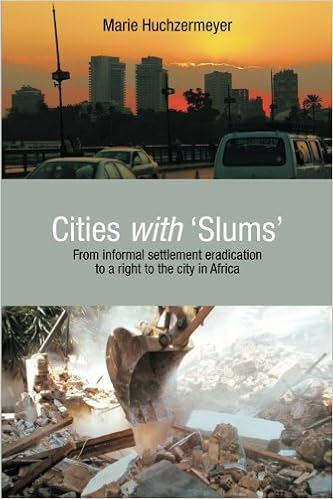
Over the past decade, South Africa witnessed an upsurge in negative labelling of informal settlements in policies and programmes, the removal of informal settlements from strategic positions in the city, and legislative amendments to facilitate such ‘eradication’.
Why were South African politicians and different parts of the state so confident that their negative statements about ‘slums’ and their drives to evict and eradicate were legitimate and beyond question?
Why did they find it appropriate to resort to repealed apartheid era legislation, criminalising the formation of informal settlements and making it easier for municipalities to evict?
Informal settlements occupy a contradictory position in urban policy.
On the one hand, there is articulated concern about urban poverty, and acknowledgement of the need to increase access to water and sanitation and improve the lives of ‘slum’ dwellers. These concerns are captured in the Millennium Development Goals (MDGs).
On the other hand, there is the encouragement to country governments for cities to strive for global economic competitiveness in order to better function as engines of economic growth.
One source of this encouragement has been the UN’s Human Settlements Programme, UN-Habitat, in particular through its involvement in Cities Alliance’s ‘Cities Without Slums’ initiative. UN-Habitat uncritically internalised ‘Cities Without Slums’ as a slogan. The UN attached this slogan to MDG 7 Target 11 ‘to significantly improve the lives of at least 100 million slum dwellers by 2020’.
The presence of unsightly ‘slums’, of visible poverty and squalor in strategic locations, frustrates states in their efforts to portray an investor-friendly image to the world. This dynamic differentiates MDG 7 Target 11 from the other MDG targets.
MDG 11 contains an un-resolvable contradiction. Improving the lives of ‘slum’ dwellers (rather than removing them from strategic locations in the city) sits at odds with efforts to make the city more investor friendly.
City authorities, in their attempts to attract and hold on to investors, encourage and protect stakes in the urban land market. The adoption of this approach is not to be questioned. It is not submitted to public and political debate.
In South Africa, preparation for the 2010 Fifa World Cup brought this into stark relief. The urgent expenditure of massive public funds remained unchallenged. They resulted in soccer precincts and the acceleration of world class transport improvements, all enhancing economic stakes in the urban land market.
Spin-offs were promised to all, unconvincingly also to informal settlement dwellers. The provision of water, sanitation and housing to a fraction of informal settlements in turn received much public political attention.
The N2 Gateway pilot project in Cape Town, South Africa’s flagship ‘slum’ redevelopment exercise from 2004 to 2010, symbolised a tendency to override policy and legislation, as did numerous cases in South Africa’s six largest cities to evict informal settlement residents from strategic locations without court order and without provision of alternative accommodation.
All these interventions amounted to attempts at exclusion of the poor from South African cities.
In the light of those attempts, urban informality needs to be reinterpreted. It can no longer be viewed merely as the extra-legal, nor as a continuum with blurred edges, as defying measurement, or an organising logic or idiom of planning. Informality needs to be recognised as a field of tension.
While households living in informal settlements often choose an urban life and many find themselves with no alternative, they are confronted with more than just the physical inadequacies and hardships of informality – the lack of basic services, the unregulated and often overcrowded conditions, the inadequacy and insecurity of the shelter.
Recognising the reality of informal settlements as a field of tension forces us to look beyond mere physical symptoms. It forces us to grapple with the underlying causes of informality and the underlying causes of non-improvement of people’s lives, such as top-down interventions.
It also forces us to depart from a normative framework that labels informal settlements as ‘slums’ and condemns every aspect of these residential setups.
It forces us to recognise the tension between creativity and adversity which shapes and often defines ingenious solutions, models of human co-existence that are largely lost in the formal city. Opportunities for such forms of urban living and survival are closed down through tightened anti-land invasion measures and ‘slum’ eradication drives.
City authorities often repressively dismiss demands from economically weak households for space within the city. Their assumption is that such demands stem from poor migrants entering the city in large numbers.
However, the population of many cities in Africa is growing more slowly than is generally assumed. Urban poverty is largely generated by shrinking formal employment. In many instances migration has remained circular, binding rural with urban livelihoods on an ongoing basis.
Poor people’s responses, alternatives and innovations have been homogenised and problematised. Global usage of the term ‘slum’ since 2000 forms part of this homogenisation and problematisation. `Slum’ justifies blanket eradication of poor people’s footholds in the city.
In 2010, something different began to happen. South Africa experienced an about-turn with a new target to improve the lives of 400 000 households by 2014 through in situ upgrading of informal settlements.
Now the government faces the difficult task of chiselling away at the deeply entrenched problematisation and homogenisation, which has long informed largely flawed re-housing programmes. This prejudice has also blocked any investigation of the feasibility of in situ upgrading rather eviction and eradication. Perhaps it’s time to respect rather than remove those who live in informal settlements.
(This article is based on the author’s book Cities with “Slums”: From informal settlement eradication to a right to the city in Africa, University of Cape Town Press, Cape Town, 2011)